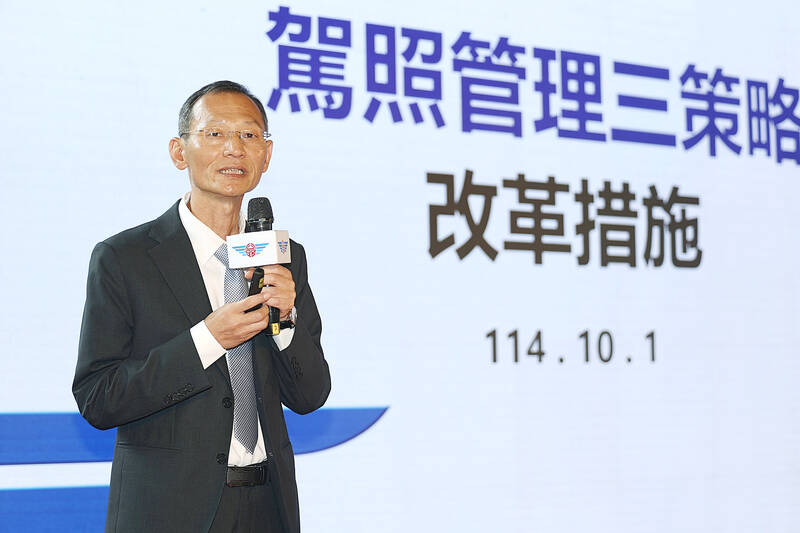Changes to driver’s license regulations aim to reduce the number of unqualified drivers on the roads, the Highway Bureau said yesterday.
The 17 changes targeted three facets of licensing regulations, including making exams harder by removing yes-or-no questions and replacing them with multiple-choice questions, the bureau said.
The number of questions that test would-be drivers on their situational awareness in the tests for car and scooter licenses would be increased, it added.

Photo: Wu Chia-sheng, Taipei Times
The new tests would have portions that assess knowledge of situations in which drivers must yield to pedestrians and use of rearview mirrors to mitigate blind spots, it said.
A point-and-call assessment would be implemented in tests for large vehicle licenses, it said.
The point-and-call system requires drivers to look both ways, indicating their view with their hands, and state that no vehicles are approaching from either direction before making a turn, it said.
Simulated driving would be added to driver education courses, while scooter riding education would require on-the-road training and tests, the bureau added.
On the road, drivers who run red lights, fail to yield at crossings without signage or fail to reduce speed at pedestrian crossings, hospitals and schools three times a year, or twice for large vehicles, would be required to attend traffic safety courses, it said.
People who drive without a license before they are old enough to sit the test, and people who contravene the law against driving under the influence of alcohol or other regulations multiple times would be required to attend special courses, with the duration of the courses lengthened, it said.
Drivers who have had their license rescinded and banned from taking a new license test for three years must attend driving education courses before being allowed to retake the test, it said.
People aged 70 or older must undergo a physical examination by a medical professional to gauge their ability to be behind the wheel, the bureau said.
After passing a physical, elderly people would receive a license valid until they are 75, after which they must renew it every three years, it said.
Elderly drivers who cause a crash resulting in injury or death are required to pay for and attend a driver education course before they can obtain a new license, it said.
People aged 70 or older who do not renew their license would receive subsidies for the TPASS public transport program, which would be extended to cover taxi fares, the Ministry of Transportation and Communications said.

‘WIN-WIN’: The Philippines, and central and eastern European countries are important potential drone cooperation partners, Minister of Foreign Affairs Lin Chia-lung said Minister of Foreign Affairs Lin Chia-lung (林佳龍) in an interview published yesterday confirmed that there are joint ventures between Taiwan and Poland in the drone industry. Lin made the remark in an exclusive interview with the Chinese-language Liberty Times (the Taipei Times’ sister paper). The government-backed Taiwan Excellence Drone International Business Opportunities Alliance and the Polish Chamber of Unmanned Systems on Wednesday last week signed a memorandum of understanding in Poland to develop a “non-China” supply chain for drones and work together on key technologies. Asked if Taiwan prioritized Poland among central and eastern European countries in drone collaboration, Lin

The Chien Feng IV (勁蜂, Mighty Hornet) loitering munition is on track to enter flight tests next month in connection with potential adoption by Taiwanese and US armed forces, a government source said yesterday. The kamikaze drone, which boasts a range of 1,000km, debuted at the Taipei Aerospace and Defense Technology Exhibition in September, the official said on condition of anonymity. The Chungshan Institute of Science and Technology and US-based Kratos Defense jointly developed the platform by leveraging the engine and airframe of the latter’s MQM-178 Firejet target drone, they said. The uncrewed aerial vehicle is designed to utilize an artificial intelligence computer

Renewed border fighting between Thailand and Cambodia showed no signs of abating yesterday, leaving hundreds of thousands of displaced people in both countries living in strained conditions as more flooded into temporary shelters. Reporters on the Thai side of the border heard sounds of outgoing, indirect fire yesterday. About 400,000 people have been evacuated from affected areas in Thailand and about 700 schools closed while fighting was ongoing in four border provinces, said Thai Rear Admiral Surasant Kongsiri, a spokesman for the military. Cambodia evacuated more than 127,000 villagers and closed hundreds of schools, the Thai Ministry of Defense said. Thailand’s military announced that

CABINET APPROVAL: People seeking assisted reproduction must be assessed to determine whether they would be adequate parents, the planned changes say Proposed amendments to the Assisted Reproduction Act (人工生殖法) advanced yesterday by the Executive Yuan would grant married lesbian couples and single women access to legal assisted reproductive services. The proposed revisions are “based on the fundamental principle of respecting women’s reproductive autonomy,” Cabinet spokesperson Michelle Lee (李慧芝) quoted Vice Premier Cheng Li-chiun (鄭麗君), who presided over a Cabinet meeting earlier yesterday, as saying at the briefing. The draft amendment would be submitted to the legislature for review. The Ministry of Health and Welfare, which proposed the amendments, said that experts on children’s rights, gender equality, law and medicine attended cross-disciplinary meetings, adding that